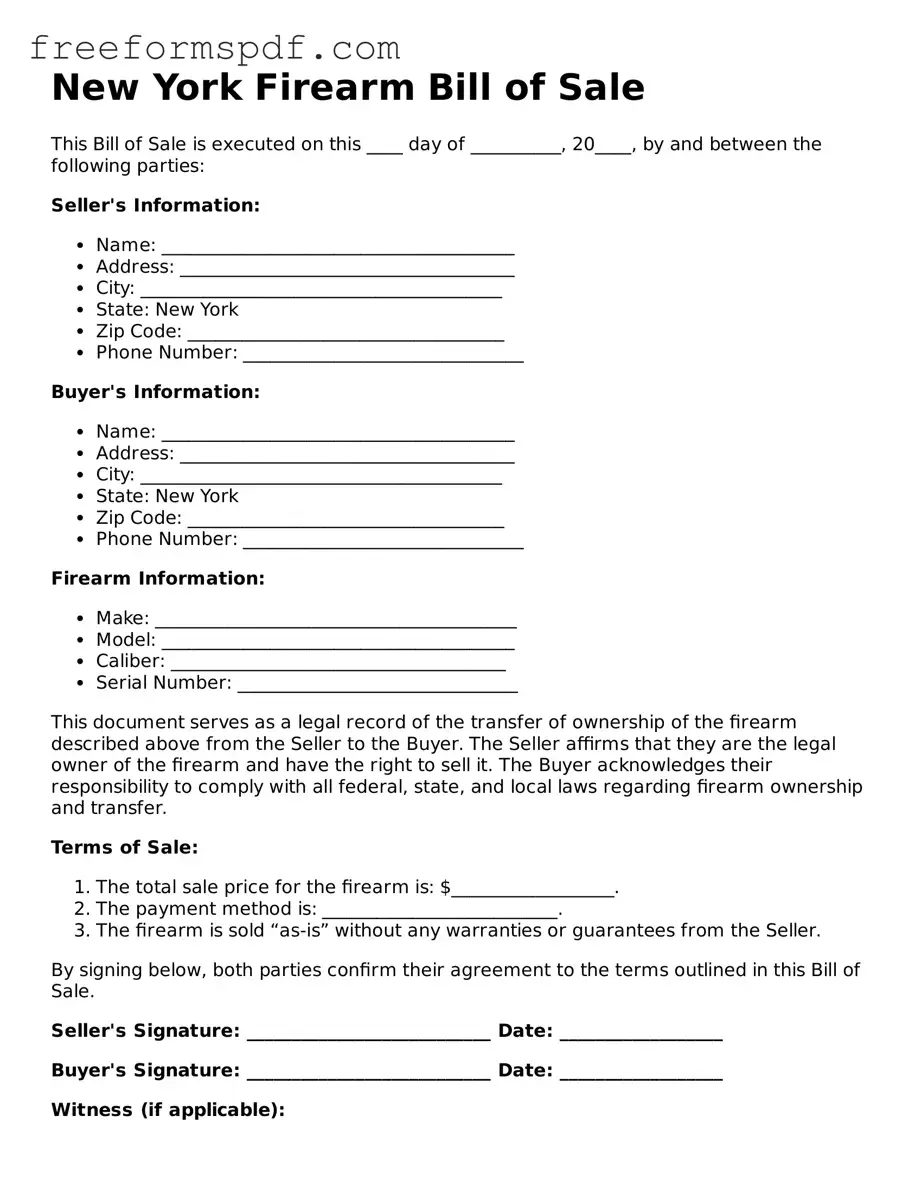Attorney-Verified Firearm Bill of Sale Document for New York State
Common mistakes
-
Incomplete Information: Failing to provide all required details can lead to delays or rejection. Ensure that every section is filled out completely, including names, addresses, and firearm details.
-
Incorrect Firearm Description: Misidentifying the firearm can create legal issues. Double-check the make, model, caliber, and serial number to ensure accuracy.
-
Not Notarizing the Document: Some transactions require notarization for validity. Make sure to have the form notarized if required, as this adds a layer of authenticity.
-
Failure to Retain Copies: Not keeping a copy of the bill of sale can cause problems later. Always retain a signed copy for your records to prove ownership and transaction details.
-
Ignoring State Laws: Overlooking specific state regulations can lead to complications. Familiarize yourself with New York's firearm laws to ensure compliance during the sale.
Learn More on This Form
-
What is a Firearm Bill of Sale?
A Firearm Bill of Sale is a legal document that records the transfer of ownership of a firearm from one person to another. This document serves as proof of the transaction and includes important details about the firearm, the buyer, and the seller.
-
Is a Firearm Bill of Sale required in New York?
While New York does not legally require a Bill of Sale for private firearm transactions, it is highly recommended. Having a Bill of Sale can provide protection for both the buyer and the seller by documenting the transfer and establishing a clear record of ownership.
-
What information should be included in the Firearm Bill of Sale?
- The full names and addresses of both the buyer and the seller.
- The date of the transaction.
- A description of the firearm, including make, model, caliber, and serial number.
- The purchase price of the firearm.
- Signatures of both the buyer and the seller.
Including all this information helps ensure that the document is complete and legally sound.
-
Can I use a Firearm Bill of Sale for multiple firearms?
Yes, a Firearm Bill of Sale can be used to transfer multiple firearms in a single transaction. In such cases, it is important to list each firearm with its respective details to avoid any confusion regarding ownership.
-
Do I need to have the Firearm Bill of Sale notarized?
Notarization is not required for a Firearm Bill of Sale in New York. However, having the document notarized can add an extra layer of authenticity and may be beneficial if any disputes arise in the future.
-
What should I do with the Firearm Bill of Sale after the transaction?
Both the buyer and the seller should keep a copy of the Firearm Bill of Sale for their records. This documentation can be important for legal purposes, especially if questions about ownership or the transaction arise later.
Misconceptions
Misconceptions about the New York Firearm Bill of Sale form can lead to confusion among buyers and sellers. Here are four common misunderstandings:
- It is not required for private sales. Many believe that a Bill of Sale is unnecessary for private firearm transactions in New York. However, having a written record is advisable for both parties to protect their interests and provide proof of the transaction.
- All sales must be conducted through a licensed dealer. Some people think that all firearm sales in New York must go through a licensed dealer. While dealers are required to conduct background checks, private sales between individuals do not require this. However, it is important to follow state laws regarding eligibility.
- The form is only for handguns. A misconception exists that the Bill of Sale form is only applicable to handguns. In reality, it can be used for any type of firearm, including rifles and shotguns, ensuring all transactions are documented.
- Once signed, the Bill of Sale is final and cannot be contested. Some believe that a signed Bill of Sale is unchangeable. While it serves as a legal record, disputes can still arise. It is essential for both parties to keep copies and ensure all information is accurate to avoid future issues.
Some Other Firearm Bill of Sale State Templates
How to Write a Bill of Sale for a Gun - Can be notarized to add a level of formality to the transaction.
The New York DTF-84 form not only serves as an application for Qualified Empire Zone Enterprise (QEZE) Sales Tax Certification but also guides businesses toward the important resources they need to understand the process more fully. For further insights and templates to assist in your application, visit NY Templates, which provides invaluable tools for companies looking to ensure compliance and maximize their benefits in line with the form's requirements.
Virginia Gun Bill of Sale - Encourages transparency in firearm transactions between individuals.
Gun Bill of Sale - A Firearm Bill of Sale is essential for compliance with state laws regarding firearm sales.
